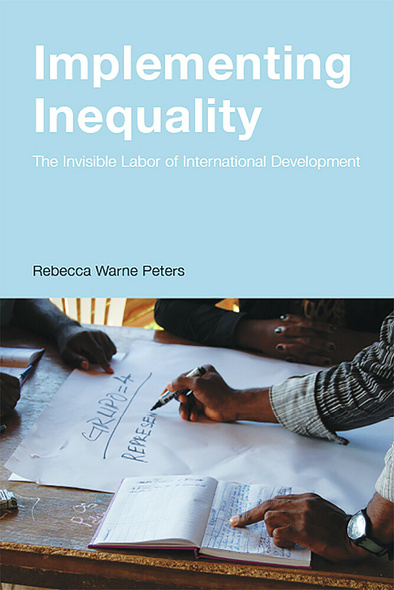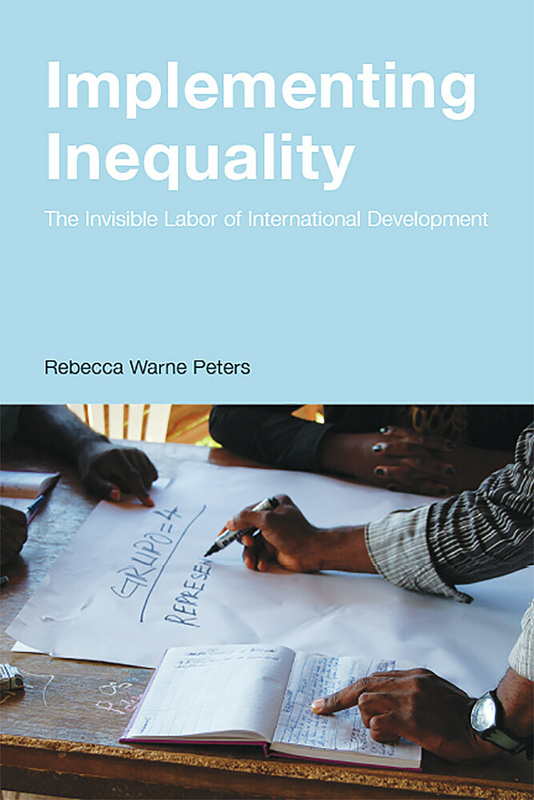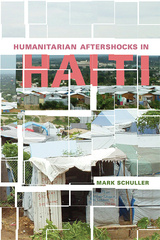
200 pages, 6 x 9
6 tables, 1 picture
Paperback
Release Date:17 Jan 2020
ISBN:9781978808966
Hardcover
Release Date:17 Jan 2020
ISBN:9781978808973
Implementing Inequality
The Invisible Labor of International Development
Rutgers University Press
Implementing Inequality argues that the international development industry’s internal dynamics—between international and national staff, and among policy makers, administrators, and implementers—shape interventions and their outcomes as much as do the external dynamics of global political economy. Through an ethnographic study in postwar Angola, the book demonstrates how the industry’s internal social pressures guide development’s methods and goals, introducing the innovative concept of the development implementariat: those in-country workers, largely but not exclusively “local” staff members, charged with carrying out development’s policy prescriptions. The implementariat is central to the development endeavor but remains overlooked and under-supported as most of its work is deeply social, interactive, and relational, the kind of work that receives less recognition and support than it deserves at every echelon of the industry. If international development is to meet its larger purpose, it must first address its internal inequalities of work and professional class.
This is a timely and well-judged analysis of the ‘internal inequalities’ that exist at the heart of the project of international development. In a thoughtful and highly readable account of a governance program in Angola, Rebecca Warne Peters combines original theoretical insight with careful empirical analysis.
Implementing Inequality is a rare book that comes alive in the best tradition of ethnographic description while building solid theory. Peters' rich account humanizes people in the 'implementariat' and their daily challenges, struggles, and decisions. Ultimately hopeful, Implementing Inequality reminds us that frontline workers are already policymakers whose experience can guide a still-possible transformative development.
Applying currently fashionable concepts with a modicum of theoretical baggage, Peters examines, in anthropological detail, international development, ‘the purposeful pursuit of social change,’ as it is carried out by the implementariate who seek to fulfill the wishes of policy makers, consultants, and donors. Well written and well organized, this is an important contribution to the literature on the intersection of international development and anthropology. Highly recommended.'
Implementing Inequality is a useful read for both students and development professionals. It could serve as a trigger for self-reflection and urges better practices and greater understanding within the sector.
Lower wages for local employees, sexism and racism in their own ranks: development organizations are not free from power relations that they actually want to abolish. Experts and employees repeatedly criticize the inequality within aid organizations. With her large-scale field study on a democratization project in Angola, anthropologist Rebecca Warne Peters makes a contribution to the debate. Above all, she reveals the balance of power between project staff and administrative employees.
Rebecca Warne Peters is an assistant professor of anthropology at the State University of New York, Oswego.
Glossary of Terms and Acronyms
Introduction
Inside the Encounter: The Implementariat
Implementation as Internal and External “Social Work”
Good Governance as “Development” in Angola
Research Methods and Chapter Sketches
Chapter 1: Development Hierarchies
The Development Industry and Development Ideology
Professional Inequalities
Principal-Agent Thinking and Development’s Common Sense
“Shadow Work” in Development
Development Work and “Making Policy”
Chapter 2: Development’s Inputs and Outputs
“Technically Skilled GGAP Staff…”
“… and Sufficient Support”
Inputs and Outputs
Invisible Development Work, Invisible Development Workers
Chapter 3: Reinforcing Hierarchies: Monitoring and Evaluation
Monitoring and Evaluation
Instruments and Tools
“Quality” Data
The “Lopsided Structures” of International Development
Chapter 4: Designing Interventions for Peers, Not Beneficiaries
Development’s Peerage
Interventions Designed for Peers, not Places
Sites Known and Unknown: Seeing Like a Donor
Reputations at Risk
Absence and Inequality in Development Intervention
Chapter 5: Partnership and the Development Praxiscape
Founding Partnerships
The Development “We”
“Battling” Toward Governance
Partners or Proprietors?
Partnership as Development Praxis
Conclusion: Development Without Borders
Shadow Work out of the Shadows
Expanding Principal-Agent Thinking
Tomorrow’s Development
Acknowledgments
Appendix: GGAP Logical Framework
Notes
Bibliography
Index
Introduction
Inside the Encounter: The Implementariat
Implementation as Internal and External “Social Work”
Good Governance as “Development” in Angola
Research Methods and Chapter Sketches
Chapter 1: Development Hierarchies
The Development Industry and Development Ideology
Professional Inequalities
Principal-Agent Thinking and Development’s Common Sense
“Shadow Work” in Development
Development Work and “Making Policy”
Chapter 2: Development’s Inputs and Outputs
“Technically Skilled GGAP Staff…”
“… and Sufficient Support”
Inputs and Outputs
Invisible Development Work, Invisible Development Workers
Chapter 3: Reinforcing Hierarchies: Monitoring and Evaluation
Monitoring and Evaluation
Instruments and Tools
“Quality” Data
The “Lopsided Structures” of International Development
Chapter 4: Designing Interventions for Peers, Not Beneficiaries
Development’s Peerage
Interventions Designed for Peers, not Places
Sites Known and Unknown: Seeing Like a Donor
Reputations at Risk
Absence and Inequality in Development Intervention
Chapter 5: Partnership and the Development Praxiscape
Founding Partnerships
The Development “We”
“Battling” Toward Governance
Partners or Proprietors?
Partnership as Development Praxis
Conclusion: Development Without Borders
Shadow Work out of the Shadows
Expanding Principal-Agent Thinking
Tomorrow’s Development
Acknowledgments
Appendix: GGAP Logical Framework
Notes
Bibliography
Index









